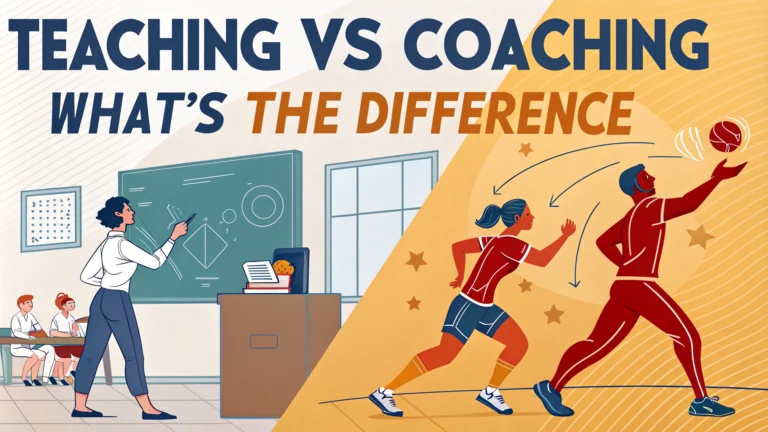Many people assume coaching and teaching are the same thing, but these two roles serve distinct purposes in personal and professional development. The key differences between teaching and coaching affect how students learn, grow, and achieve their goals.
Teachers focus on **knowledge transfer** and structured learning, while coaches emphasize **performance improvement** and personal development. Understanding these differences helps choose the right approach for specific learning needs.
Core Differences Between Teaching and Coaching
- **Teaching** delivers structured content and knowledge
- **Coaching** guides personal discovery and skill development
- **Teachers** assess through formal evaluation
- **Coaches** measure success through performance outcomes
Essential Teaching Skills and Methods
- **Curriculum development** and lesson planning
- **Assessment techniques** and grading systems
- **Classroom management** strategies
- **Knowledge transfer** methods
| Teaching Focus | Coaching Focus |
|---|---|
| Subject expertise | Performance improvement |
| Group instruction | Individual guidance |
| Academic outcomes | Personal development |
Coaching Techniques and Approaches
- **Goal-setting** and action planning
- **Active listening** and feedback
- **Performance analysis** methods
- **Motivation** and accountability strategies
“Teaching gives you knowledge, while coaching helps you apply it effectively.”
When to Choose Teaching vs Coaching
**Learning objectives** and **development goals** determine which approach works best. Teaching fits structured knowledge acquisition, while coaching suits performance improvement.
- Choose teaching when:
- Building foundational knowledge
- Working with large groups
- Following standardized curriculum
- Choose coaching when:
- Developing specific skills
- Needing personalized guidance
- Focusing on behavioral change
Combining Both Approaches
A **blended approach** often delivers the best results. Teachers can incorporate coaching techniques, while coaches can include instructional elements.
| Combined Strategy | Benefits |
|---|---|
| Group teaching with individual coaching | Deeper learning and personalized support |
| Instruction followed by guided practice | Better knowledge retention and application |
Best Practices for Each Role
**Effective teaching** and **successful coaching** require different skill sets and approaches.
- Teaching best practices:
- Clear learning objectives
- Structured lesson plans
- Regular assessment methods
- Coaching best practices:
- Personalized feedback loops
- Progress tracking systems
- Flexible development plans
Selecting the Right Approach
Match the approach to specific **learning needs** and **development goals**. Consider factors like group size, available time, and desired outcomes.
“The right approach depends on whether you need to build knowledge or improve performance.”
Create a balanced plan that leverages both teaching and coaching methods when possible. Track results and adjust strategies based on learner progress and feedback.
- Key factors to consider:
- Learning environment
- Available resources
- Student/client preferences
- Time constraints
FAQs About Teaching vs Coaching
Basic Questions
Q: What is the main difference between teaching and coaching?
A: Teaching focuses on transferring knowledge and skills through structured lessons, while coaching guides individuals to discover solutions and develop capabilities through questioning and support.
Q: Can someone be both a teacher and a coach?
A: Yes. Many educators combine both roles, teaching specific content while using coaching techniques to develop students’ problem-solving abilities and self-direction.
Methodology Questions
Q: What teaching methods differ from coaching methods?
A: Teaching typically involves:
- Structured lesson plans
- Direct instruction
- Assessment and grading
Coaching typically involves:
- Open-ended questions
- Personal goal setting
- Individualized feedback
Q: How does feedback differ between teaching and coaching?
A: Teachers provide evaluative feedback based on specific criteria, while coaches offer reflective feedback that helps individuals discover their own solutions.
Career-Related Questions
Q: What qualifications do you need to become an educational coach?
A: Educational coaches typically need:
| Basic Requirements | Additional Certifications |
|---|---|
| Teaching degree | Coaching certification |
| Teaching experience | Professional development training |
Q: Which pays more: teaching or coaching?
A: Salaries vary by location and specialty, but professional coaches often earn more per hour than teachers. However, teachers typically have more stable income and benefits.
Long-tail Keyword FAQs
Q: How do instructional coaches help teachers improve classroom management?
A: Instructional coaches observe classroom dynamics, provide targeted feedback, and help teachers develop effective management strategies through collaborative planning and reflection.
Q: What’s the difference between an academic coach and a private tutor?
A: Academic coaches focus on developing study skills, time management, and learning strategies, while tutors typically focus on subject-specific content instruction.
Q: How do sports coaches use teaching principles in athletic training?
A: Sports coaches incorporate teaching elements through:
- Fundamental skill instruction
- Strategic concept explanation
- Progressive skill development
- Performance analysis
Q: What role does mentoring play in teaching versus coaching?
A: Mentoring combines elements of both teaching and coaching, providing guidance through knowledge sharing (teaching) and personal development support (coaching).



















